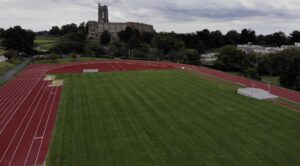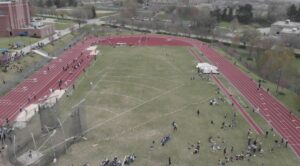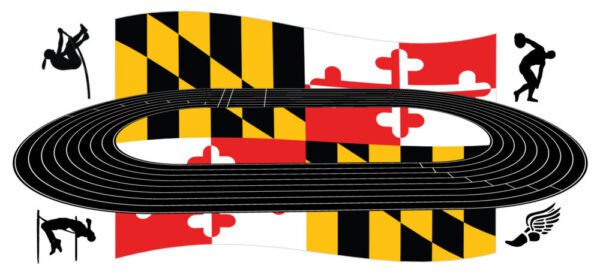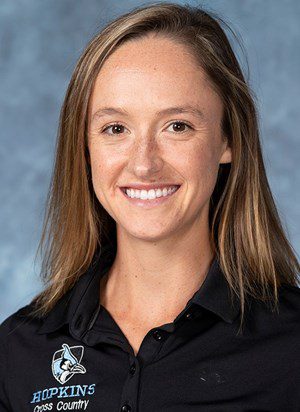October 7, 2020
Pictures courtesy of JHU Athletics
–
Maura Knestout is an assistant cross country and track coach at Johns Hopkins University. She graduated from Century High School in Sykesville, where she won multiple state titles in both track and cross country.  After Century, she competed at Syracuse, where she had a great career highlighted by her team qualifying for the 2013 and 2014 NCAA cross country championships. She also qualified for the Olympic Trials at the 2019 Houston Marathon. She finished 108th out of 390 finishers in Atlanta at the trials back in February.
–
Here Knestout talks about the The Johns Hopkins cross country program. Â The men won two Mid-East Regional Cross Country Championships in 2013 and 2016. Â The women won six National Championships in the last decade, including two since Knestout joined the program.
–
For recruiting questions and interest in Hopkins, email Coach Knestout at Mlinde2@jhu.edu
–
Could you give just a brief description of the program and team and tell us how long you’ve been at Hopkins?
This is my fourth year as Assistant Coach at Hopkins. The program really focuses on team culture and environment. The team is a very motivated group of athletes who are competitive, but also have a lot of fun with it. We are definitely a family here at the Hopkins XCTF program. Â
Â
What goals do you have for the program?
My overarching goal for the program is to increase and make more connections with health and wellness resources for our athletes. Whether it be mental health, physical health, life coaching, whatever it may be for our athletes to grow not only athletically, but personally.Â
Â
As a program, every year we set goals to create better relationships with each other as a team. We have a large team, so it is always something we are continuing to grow as a program. As a coaching staff we emphasize that the things that will follow with them after they graduate are the relationships and friendships they create now.Â
Â
Since it would normally be XC season right now, what would a typical training week look like for your team? Do you have a general overarching training philosophy?
Â
It is very strange to be in October and not have any XC. If we were in season, this would be a solid month for us in terms of racing. A typical week would be starting off Monday with an upper aerobic run, which is simply working set pace that isn’t “recovery” pace and is different for every athlete. We would have a big focus on our Tuesday workout, especially if we are racing the upcoming weekend. We like to use a variety of grass fields at Druid Hill Park for these workouts. The fields vary from flat loops to rolling hills, so depending on what goals we have for that workout we can mix up the locations. Wednesdays are our recovery days where athletes either take off, cross train, or do super easy runs. We come back Thursday for either a regular run if we are working out again Friday, or if we are racing we will do some pick ups or short reps before the weekend race. Then the weekend is either for racing, recovery, and long running.Â
Â
One of the most important aspects of our training philosophy is that every athlete is different. We have a very individualized approach to our training, and we are coaching the person as a whole. Everyone is running different miles, workouts are adjusted for many individuals, and we take into account what is going on in our athletes lives that may affect training. I think this type of holistic coaching is extremely beneficial to the athletes well being as well as their training.
Â
What facilities and resources do athletes in your program have access to? Is there something in particular that separates your facilities from other schools?
Â
We have an athlete only weight room that we are able to utilize weekly as well as the recreational gym, so our athletes have many opportunities to use the equipment and get event specific strength workouts.Â
We have a great training room and trainer who do a fantastic job helping our athletes through injuries, soreness, and preventative care. In our training room, we have an alterG treadmill which has been so beneficial for our team. Athletes coming back from injury can do so much quicker and safer, and for those who are prone to injury they can run the miles they want without risking high impact.Â
We also have the pool in our facility, which our team uses for aqua jogging. We aqua jog at least every Wednesday, and other times in the week that our athletes can get it done. Not only is the water great for recovery after a hard workout, but also reduces our injury rate.
Yoga classes are also offered to the athletes for Hopkins as a whole as well as program specific classes. I am not sure how many schools offer yoga to their athletes, but it has been a great way for our athletes to build strength, flexibility, and reduce stress. We have so many other great resources for our athletes, but I’ll leave it at those since they are our big ones.


Â
What does the recruiting process look like at Hopkins? Are there specific time standards or something in particular you look for in a recruit? How is the process now given the limitations due to COVID?
Â
There isn’t a lot of differences in the process compared to other schools, but being at Hopkins, we take into account a prospective athlete’s academics just as much as their athletics.  While we don’t have time standards that are deal breakers, we do have roster limitations which are very competitive. So we just encourage everyone to be proactive in getting in touch with the coaching staff by filling out our online recruit form at https://questionnaires.
Â
The recruiting process during the pandemic has been different, but I think we made the most out of it. We were able to do a lot through video from general recruit sessions to Q & A panels. For us, we wanted the prospective athletes to get a sense of the campus, the program, and what life is like at Hopkins. We normally have a lot of over night visits for this, but that couldn’t happen this year.Â
Â
What recommendations would you give to someone interested in competing for Hopkins?
Â
This would go for any school, but be involved and engaged with the coaches you are talking to. Don’t be afraid to keep emailing them with updates on your training, PRs, questions, etc. Not only is it helpful for coaches to stay updated with your progress, but also allows them to get to know you more as a person. You have to stay on top of the process just as much as they are.Â
Hopkins track and field website:

